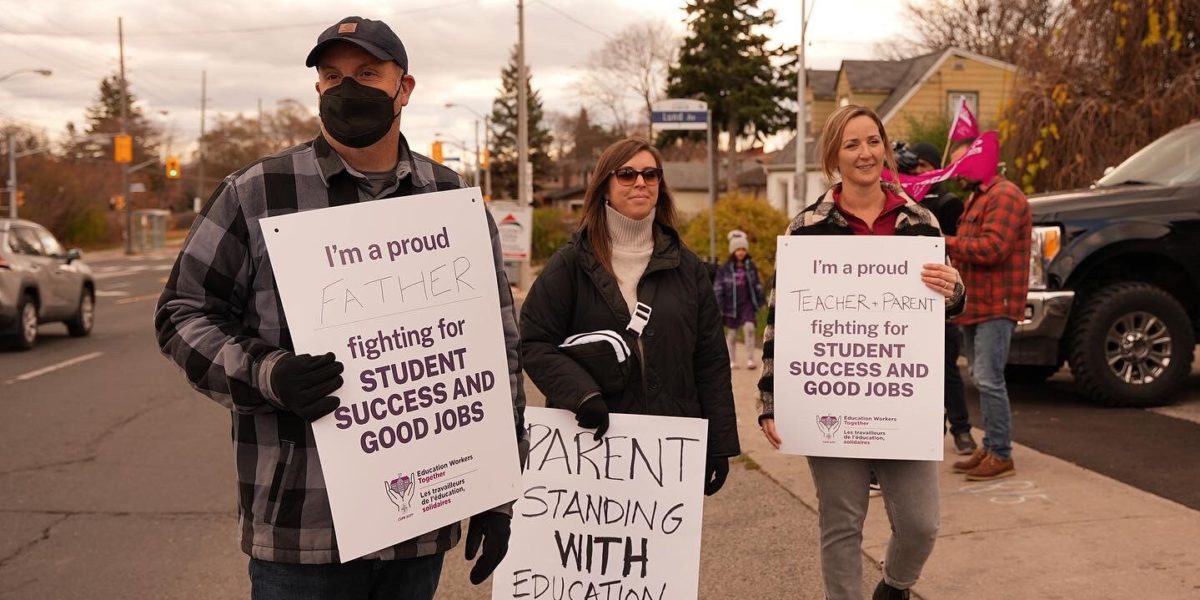The Ontario division of the Canadian Union of Public Employees (CUPE) announced on Wednesday, Nov. 16 that talks between the province have again reached an impasse. As a result of the breakdown in negotiations, CUPE Ontario’s 55,000 education support workers will be on strike on Monday, November 21.
Laura Walton, president of the Ontario School Boards Council of Unions (OSBCU) which negotiates on behalf of CUPE Ontario’s education support workers said while they were able to negotiate a middle-ground with the province when it came to workers’ wages, funding for education itself has become a sticking point.
“From the beginning, we’ve been focused on improved jobs for education workers and improved services for students. For us, there is no one without the other,” said Walton. “It’s incredibly disappointing that the Ford government categorically refused to put money on the table to give students the type of learning environment they need.”
CUPE fighting education funding cuts
CUPE Ontario is critical of the cuts to education they claim Premier Doug Ford’s government has made over the past four years. CUPE Ontario states the government cut $1.6 billion in education funding last year.
The union is seeking further funding for education so more education support workers can be hired. As it stands now, CUPE Ontario claims that there are not enough education assistants (EA) for all students. The union says some students are being sent home due to the lack of an EA. Additionally, CUPE Ontario wants to see funding so that each kindergarten class in Ontario has an early childhood educator (ECE). Other jobs they would like to see created include more librarians, more janitorial staff and more administrative support staff.
In a statement released on Wednesday, Education Minister Stephen Lecce said that he is still willing to negotiate. He says that he had offered an increase of funding for education support workers.
“We offered $335 million more over four years for CUPE workers alone,” reads a tweet from Lecce. “We are disappointed that only a few short days after talks restarted, CUPE has once again filed notice to shutdown classrooms. Since resuming talks, we have put forward multiple improved offers that would have added hundreds of millions of dollars across the sector, especially for lower income workers.”
Angela Brandt, president of the Ontario Autism Coalition explained that more funding for education was essential.
“Families are in crisis and for most parents, school is the only refuge for their children. Without proper support, children with special needs are not able to access the curriculum and their safety is at risk,” Brandt said. “Children with autism and special education needs require additional support. They need educational assistants in the classroom. The value of these workers is priceless. Without these frontline education workers, our children may not be able to attend school at all.”
Wages seemingly settled
A central issue of the negotiations between CUPE Ontario and the province up to this point has been on the issue of wages. It seems that an agreement on that point at least has been reached. Both sides now shift their focus to education funding.
In October, CUPE was holding firm to their offer of a $3.25 an hour flat rate increase for all of its 55,000 education support workers. The average wage for their workers was $39,000 a year and CUPE explained that between 2012 and 2022 CUPE education support workers had already seen their real wages decline by 11 per cent.
Initially, the Ford government was only willing to offer a wage increase of between $0.33 and $0.53 an hour.
At the end of October, when CUPE rejected the province’s offer and threatened to strike, Ford tabled the now infamous Bill 28. Bill 28, by way of the notwithstanding clause, violated the rights of workers to strike and negotiate with their employer by imposing a contract on them which came with a wage increase of just 2.5 per cent a year over three years, which is well below the rate of inflation.
READ MORE: Ford blinks in face of union solidarity; will repeal Bill 28
At the beginning of this month, public and private sector unions across the country rallied to show solidarity with CUPE. Just as a general strike seemed imminent, Ford blinked and repealed Bill 28 on Monday, November 14.
More funds for students
CUPE explained in their latest strike notice that the Ford Government in its first term cut funding by about $800 per student.
“This is not where we wanted to be,” said Walton. “We hoped the Ford government would accept our reasonable, affordable, and necessary proposals five months ago. We hoped they’d recognize the urgency of workers’ plea for resources in our historic strike vote. We hoped they’d respond to last week’s show of parent and worker solidarity. Yet they came back without a single cent for students. They’ve left us no choice.”
School boards have yet to announce how they will react to the strike. Ontario’s largest school board, the Toronto District School Board, stated that they were still finalizing information and would update parents soon.



